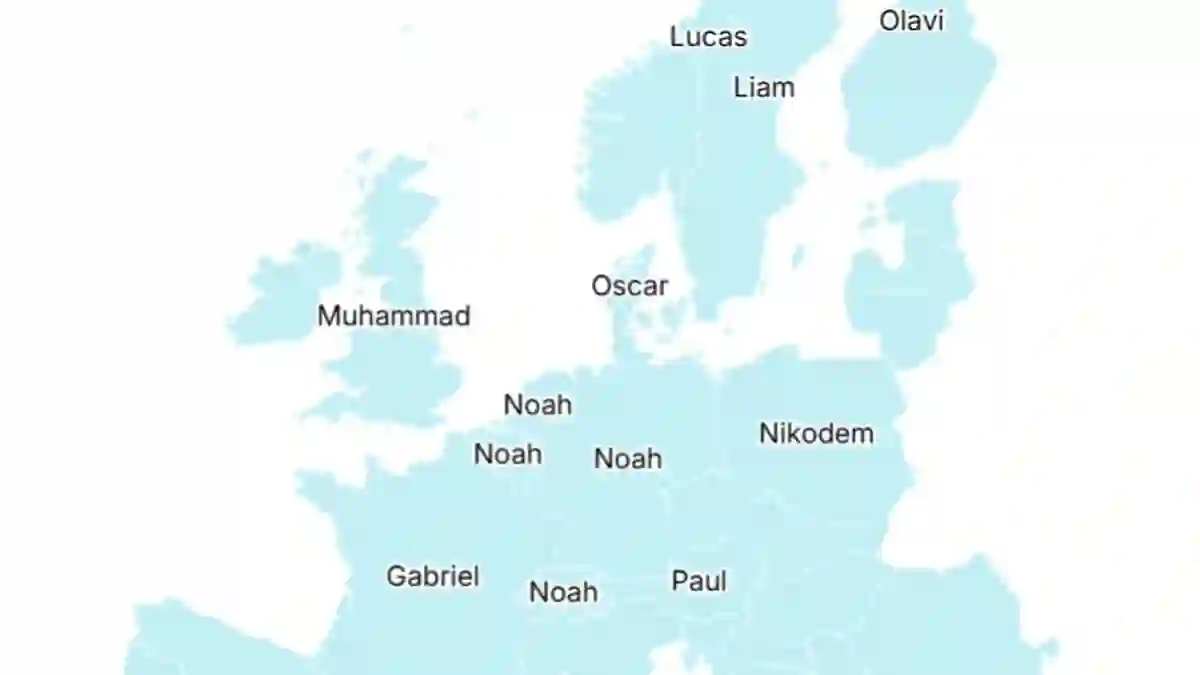Choosing a baby name can feel like a huge decision, and it’s fascinating to see which names are trending across Europe right now.
Thanks to new data compiled by the Daily Mail, we now know which baby names are topping the charts in 16 European countries — with Noah and Louise leading the way in Germany and France respectively.
Noah Takes the Lead for Boys While Louise Tops Girls’ Lists
For boys, Noah seems to be the name on everyone’s lips — it’s the most popular choice in four of the countries surveyed.
For girls, Louise takes the top spot in France, but Emma and Olivia aren’t far behind, sharing the number one rank in two countries each.
Name expert Clare Green from baby-naming site Nameberry shared with us why Noah is so popular despite being considered a bit vintage.
She said, “Biblical names have a universal appeal.
Noah hadn’t been widely used for a while, but pop culture moments, like the movie The Notebook, helped bring it back in style.
Parents across Europe felt it was the perfect time for it to make a comeback.”
Hollywood, Music, and Royalty Shape Naming Trends
When it comes to inspiration, parents often look to Hollywood stars, music icons, or royal families.
Clare mentioned that the name Emma gained popularity across Europe about 20 years ago, largely influenced by Jennifer Aniston’s character Rachel naming her child Emma in the US sitcom Friends.
However, not all names travel easily across borders.
Clare noted that more complex Scandinavian names tend to stay local because they can be tricky to pronounce elsewhere.
Instead, simple-sounding names have the advantage of crossing cultures more smoothly.
Globalization and Mixed Heritage Influence Baby Names
With modern media and travel connecting people more than ever, Clare believes baby names will become even more internationally shared in the coming years.
She pointed out that many couples now come from different countries and cultures, leading them to pick names that suit both backgrounds.
Still, she cautions that some parents will want to stick with traditional or local names.
Classic Names and Short Forms Hold Their Ground
Digging deeper, the data shows a strong presence of classic names and their shorter versions — like Tom or Sam — becoming popular first names on their own.
The Czech Republic, for example, has seen remarkable stability in its naming trends, with Jakub and Eliška leading for boys and girls respectively for over a decade.
Cultural Traditions Impact Naming Across Europe
A spokesman from Preply, a language learning platform, explained how traditions affect naming choices differently across Europe.
“In countries like Italy and Spain, classic names with religious or historical roots remain strong,” he said.
“These cultures tend to cherish family traditions and passing names through generations.”
On the other hand, places like Sweden, the UK, and the Netherlands are seeing a shift toward more creative or international names.
This reflects growing exposure to global media and a stronger focus on individuality.
The UK’s Liberal Naming Rules Compared to Europe
Speaking of the UK, it has some of the most relaxed naming rules globally, similar to the US. Parents can choose almost any name unless it’s clearly offensive.
For example, a mother in Wales was stopped from naming her daughter Cyanide in 2016, but otherwise, restrictions are minimal.
Contrast this with countries like Denmark, where parents must pick names from an approved list of 7,000 or get special permission, and unisex names are not allowed.
Germany also requires names to clearly indicate gender and bans surnames as first names.
France and Switzerland have rules against embarrassing or brand names, rejecting choices like Nutella or Mercedes.
Science Shows Why Some Names Get the Nod
Interestingly, science has weighed in on baby names too.
Research suggests that people with easy-to-pronounce names are often viewed more positively and judged more favorably.
Studies found that shorter, simpler names can create a sense of familiarity and likability, which might influence social outcomes.
One LinkedIn analysis even showed that CEOs tend to have short, simple names.
Meanwhile, research from the National Bureau of Economic Research linked traditionally female-sounding names for boys to higher chances of school disciplinary issues, possibly due to social pressures linked to a name.
Names Reflect Parents More Than Destiny
Clare Green pointed out that while parents might use science to guide their choice, a name usually tells you more about the parents’ background, beliefs, and culture than about the child’s future.
“Names are probably a sign of what parents think and believe, not a cause of life changes,” she said.
“Teachers often have expectations just based on names alone.”
Data Comes from Official Sources Across Europe
This extensive analysis pulls data from official statistics institutes in countries including France, Czech Republic, Sweden, Belgium, Austria, Switzerland, Germany, Spain, Ireland, Poland, Denmark, Norway, Finland, Italy, and the Netherlands.
It only includes official first names, so common nicknames or informal names aren’t counted.

